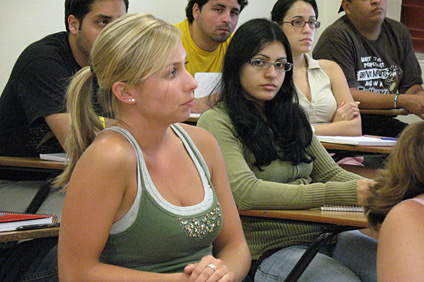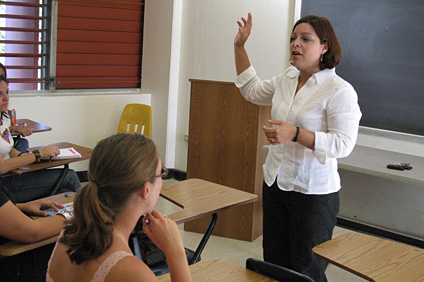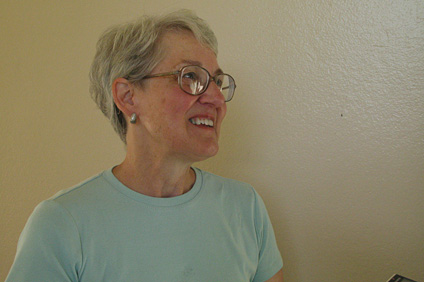|
|
|
Friday, January 30th 2009 [ versión español ]
What began as a collaborative project to promote the exchange between the University of Puerto Rico at Mayagüez (UPRM) and the University of Delaware saw the first fruits of its labor with the visit of 10 students, from distinct academic concentrations, in search of an experience that allowed them to understand the importance of science in everyday life.
During a five week stay in Puerto Rico, the students were able to relate science with all human activities through conferences, classes, and trips to various parts of the Island. As part of the collaborative agreement students attended social science classes offered at UPRM, and more than just science, they experienced a different culture, as explained by doctor Marla Pérez Lugo, associate professor of the Department of Social Sciences (CISO by its Spanish acronym) at UPRM.
Doctor Cecilio Ortiz, also from CISO, explained that the students were integrated into the Public Administration class (CIPO 4045) which was offered this semester. During this class they shared concerns and experiences about environmental problems in Puerto Rico, as well as those in Delaware.
He signaled that some of the biggest challenges of Puerto Rican public administration are associated to the relation between humans and nature. “These exchanges are extremely important for both my students in public administration as well as those students in Delaware. Through the comparative analysis of environmental matters they can identify, in a distinct manner, the environmental problems that affect both societies.
Similarly, Pérez Lugo confirmed that “we intend to contextualize environmental matters through the active participation of social scientists, who have limited themselves to providing data for environmental studies without going any further.” According to the professor it’s about applying politics to favor the environment; it is because of this that the role of the social scientist is so important.
The participants of this first scholarly exchange to Puerto Rico, who are part of the Study Abroad Program, are students from Elementary Education, Political Science, Anthropology, Nutrition, Business Administration, Chemistry, Animal Sciences, and Natural Resource Management, among others.
As explained by doctor Susan W. King, professor at the University of Delaware who accompanied the students on their journey, the principal objective of the Study Abroad Program is to demonstrate to these university students that science can help them in their future careers. That is also the purpose of the course she teaches at the University of Delaware called Environmental Science in the Rainforest, in which she expects they understand science and convert into productive citizens for society.
The program is divided into classes, and trips to the country in which group and individual projects are realized. One of the trips included eleven days in which they stayed in the Green Reserve, part of the UPR.
“To live in a tropical forest demonstrated that human beings can alter the environment through the activities they carry out,” mentioned the entomology professor.
During their stay in the west, students visited Casa Pueblo in Adjuntas, with the purpose of understanding other ways to manage the resources aside from government intervention, ecotourism and conservation efforts. They also visited the Hacienda Buena Vista in Ponce, which helped them to understand the existing relation between history and culture.
One of the most impacting trips for the group was to the Parguera in Lajas. “To visit Cayo Enrique, to be close to the reef and observe the organisms that coexist there allowed them to observe the influence of human activities on nature,” indicated Pérez Lugo.
Before leaving to Delaware, they visited the Parador Palmas de Lucía in Yabucoa to observe how an installation of this type operates; it is classified as an ecological hotel. They also visited a sector of Guayanilla, where they are proposing to install windmills, to share with the residents who oppose an environmentally good project.
“As a professor of public environmental politics, this program gives me the opportunity to utilize a more comparative focus in the analysis of environmental matters. The integration of the Study Abroad Program, a UPRM course, permits us to enrich the academic experience of our students, to expand their horizons of analysis and expose them to the experiences of students from other countries, which many times are facing the same or worse challenges in terms of environmental protection,” emphasized Ortiz.

Participants shared their concerns and experiences about environmental problems in Puerto Rico as well as in Delaware.

Doctor Cecilio Ortiz explained that this type of exchange allows the students to identify in a distinct way the environmental problems that affect both societies.

Doctor Marla Pérez Lugo emphasized the role environmental scientists in the forming of environmental politics.

For doctor Susan W. King, the program demonstrated to its participants that science can help them in the future careers.
Photos by Mariam Ludim Rosa Vélez / UPRM Press
|

